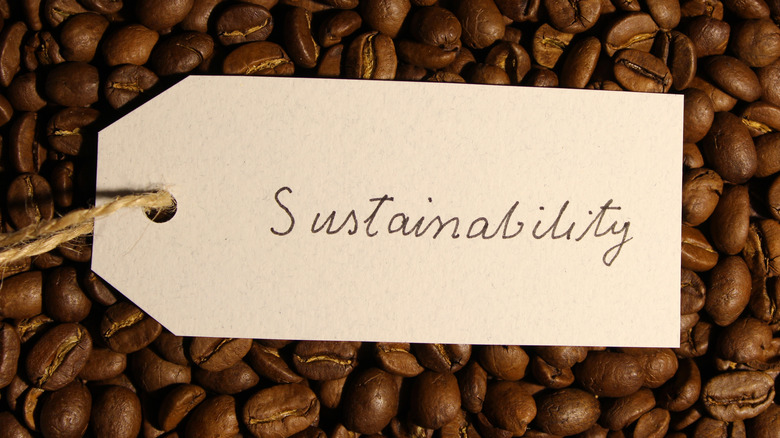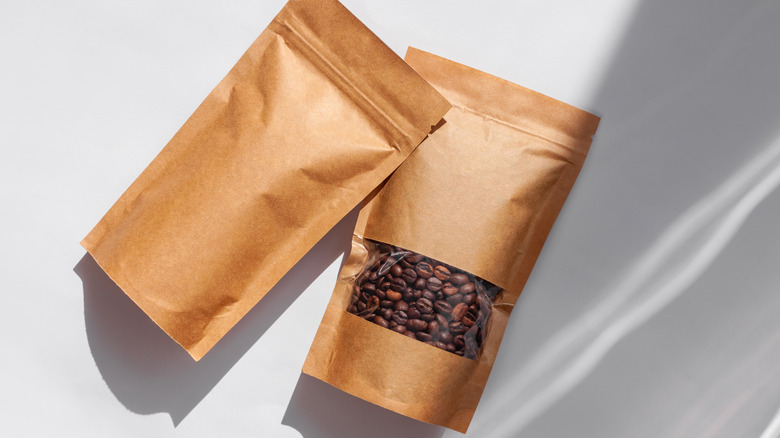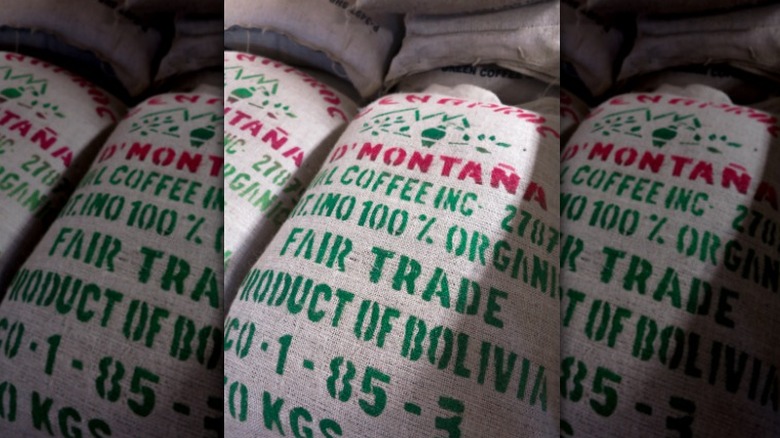How To Tell Coffee Is Sustainable Based On The Label
Coffee is the most popular beverage in the world, and nothing indicates that it will change anytime soon. But people are thinking more about the impact of what they consume, from the social to the environmental. From fair trade to organic, and shade-grown to bird-friendly, many consumers are demanding higher standards for sustainability when it comes to their coffee beans.
Coffee bean farmers face many challenges as rising temperatures fuel floods, droughts, and the spread of plant diseases. But when it comes to climate change, the coffee industry has a hand in its own adversity, as it contributes to the more than 200,000 total acres of rainforest that are burned down each day. Much of the industry also practices mono-cropping, an agricultural method that depletes the soil and increases reliance on pesticide sprays. The industry still has a long way to go on the human side of coffee production as well. Even though most coffee is consumed in Europe and North America, more than 80% of it comes from the global south — and it's on smallholder farms specifically where unfair working conditions and child labor are all too common.
The good news is that as more people become aware of these issues, more companies aim to do better, and sustainable coffee options hit the shelves. Here's how to find them.
Not so reliable labels
As consumer awareness surrounding the social and environmental shortfalls of the coffee industry has expanded, so too have brands touted their commitment to the cause. This has led to a number of labels and certifications that are placed on the packaging for easy identification. The problem is that it can be difficult to know which amount to green-washing and which are backed by real-world change. One cannot just assume that pricier beans equate to better working conditions or environmental practices, even if the bags are plastered with official-looking labels. The only way to know is by decoding sustainable coffee labels — and to do that, you need to know which labels are meaningful and which aren't.
The first label to look out for is "shade-grown." Purportedly, shade-grown coffees are produced through agroforestry, an agricultural practice that blends agriculture and woods with crops. And while it's a sustainable practice — the precise opposite of mono-cropping, as it doesn't disturb native tree growth — it doesn't have any legal definition for it, so there is no standard to meet or official body to satisfy for using the label.
Then, there's the "direct trade" label, which, theoretically, means that the coffee distributor and the farmer have a direct relationship. While coffee that's traded should equate to better pay for farmers, again, the term isn't regulated by any official body.
For this reason, you shouldn't bank on these labels when shopping for sustainable coffees.
Legitimate sustainability labels
All that being said, there are a few labels that you can look for that are the real deal — the first being the USDA Organic seal. Coffees with this label are inspected regularly to ensure they're not using any of the environmentally damaging pesticides and other agricultural practices that are so prevalent in coffee production. While it's certainly leveraged in marketing coffee, it does have a legal definition, and carries the weight of close government scrutiny.
Another label you should look for is "Fair Trade Certified" — emphasis on the "certified." This is because the term "fair trade," (which is also commonly seen) has no legal meaning, "Fair Trade Certified" does. Coffees with this label receive certifications from one of two organizations: Fair Trade International or Fair Trade USA. The certification signifies that the farmers receive a minimum price per pound, no matter if the market price is below that mark, and work under fair and safe conditions. You can also find it on products like sugar and cocoa.
"Bird-Friendly Certified" is a newer label that's been appearing on coffees, but its strict regulations around shade growing, pesticide use, and association with the Smithsonian Migratory Bird Center make it a dependable one. Other certifications like Rainforest Alliance Certified and UTZ Certified can be meaningful but have been criticized for being too lenient in approving certifications. For these labels, do your own research to see how well (or not) coffee brands are working toward a sound future for coffee.


